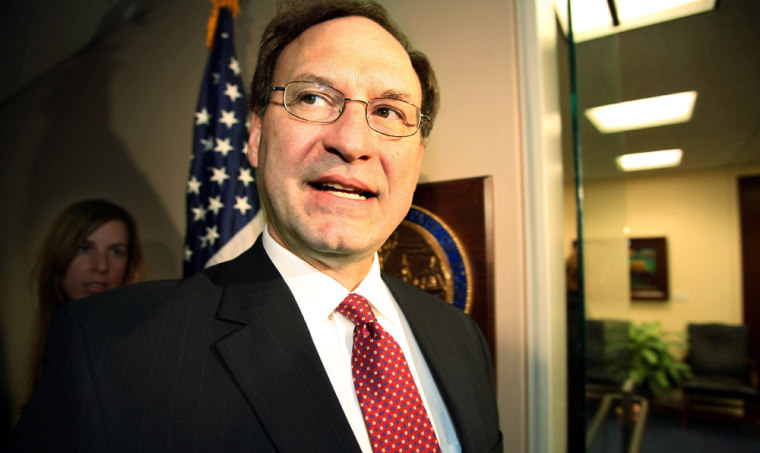Supreme Court nominee Samuel Alito boasted about his work arguing that “the Constitution does not protect a right to an abortion” while trying to get a job in the Reagan administration as a deputy assistant attorney general, according to documents released Monday.
Alito, a federal appellate judge nominated by President Bush to the nation’s highest court, was a young lawyer working for the solicitor general’s office in 1985 when he applied for a position under Attorney General Edwin Meese.
As part of his application, Alito sent in a document saying his work in the solicitor general’s office had included helping “to advance legal positions in which I personally believe very strongly.”
“I am particularly proud of my contributions in recent cases in which the government argued that racial and ethnic quotas should not be allowed and that the Constitution does not protect a right to an abortion,” he wrote.
That sentence provides one of the first clear-cut statements attributed to Alito about abortion, which will be one of the main topics of his January confirmation hearing as retiring Justice Sandra Day O’Connor’s replacement.
Abortion to be discussed during hearings
“I think that it is more reason to question him closely at the hearing,” said Sen. Arlen Specter, R-Pa., who will run Alito’s Jan. 9 hearings as chairman of the Senate Judiciary Committee.
Specter, an abortion rights moderate, said a lot of people have shifted their views about abortion over the years and that he has found Alito to have “a very heavy commitment to legal interpretation which might differ from his own personal views.”
Bush picked Alito after White House counsel Harriet Miers withdrew her Supreme Court nomination because of withering criticism by some conservatives.
“This may explain why the right wing expressed such enthusiastic support for Judge Alito after campaigning against Harriet Miers,” said Sen. Edward Kennedy, D-Mass., one of several senators who will meet with Alito privately on Tuesday. “When he comes before the Senate, Judge Alito faces a heavy burden of demonstrating that he no longer holds these extremely troubling views and would bring an open mind and a real commitment to fundamental rights and freedoms.”
O’Connor has been a crucial swing vote on abortion on the Supreme Court, and Alito’s opponents fear that he and recently confirmed Chief Justice John Roberts would swing the Supreme Court to the right and lead to the overturning of the 1973 landmark Roe v. Wade decision establishing abortion rights.
Alito, 55, has told senators in his two weeks of private meetings that he has “great respect” for Roe v. Wade, but he did not commit to upholding it.
Put personal views aside?
Alito “joins a long list of jurists who have written that Roe was wrongly decided, including Ruth Bader Ginsburg before she was confirmed to the court,” said Sen. John Cornyn, R-Texas, a member of the Judiciary Committee. “The question is whether he will put his personal views aside as any judge should and base his rulings on what the Constitution says. His long track record as a federal appeals court judge shows that he has indeed put his personal views on abortion aside, and I have every confidence he will continue to do so.”
The document was included in more than 100 pages of material about Alito released by the Ronald Reagan Presidential Library and the George H.W. Bush Presidential Library on Monday.
Some abortion rights groups already have come out against Alito because of his work as a federal appellate judge, including a dissent on an appeals court decision striking down a law requiring women seeking abortions to notify their spouses.
But White House spokesman Steven Schmidt said Alito’s 15 years as a judge on the 3rd U.S. Circuit Court of Appeals shows “a clear pattern of modesty, respect for precedent and judicial restraint.”
When he wrote this document, he was working as an assistant to the solicitor general, where he stayed from 1981 to 1987. Although he sought the job of deputy assistant attorney general in 1985, he did not win that job until 1987.
Donations made to GOP groups
In the document, Alito declared himself a “lifelong registered” Republican and a Federalist Society member, and said he had donated money to the National Republican Congressional Committee, the National Conservative Political Action Committee and several GOP candidates.
“I am and always have been a conservative and an adherent to the same philosophical views that I believe are central to this administration,” Alito said.
Alito also wrote that he believed “very strongly in limited government, federalism, free enterprise, the supremacy of the elected branches of government, the need for a strong defense and effective law enforcement and the legitimacy of a government role in protecting traditional values.”
The 1985 document on abortion was first reported by The Washington Times in Monday editions.
Kennedy, who is also a Judiciary Committee member, wrote Alito on Monday questioning his explanations for ruling on a Vanguard case after telling the committee in 1990 that he would recuse himself from cases involving that company.
Alito holds six-figure investments with Vanguard.
In a Thursday letter, Alito told senators he was “unduly restrictive” in promising to avoid Vanguard's appeals cases, and he did not believe he was required to disqualify himself on the basis of ownership of shares in a mutual fund. The White House has added that there was a computer glitch that allowed the disqualification issue to slip through undetected.
The Vanguard name was prominent throughout the case, Kennedy said. “Surely, whatever the system, the oversight should have been obvious when the case reached you,” the letter said.
